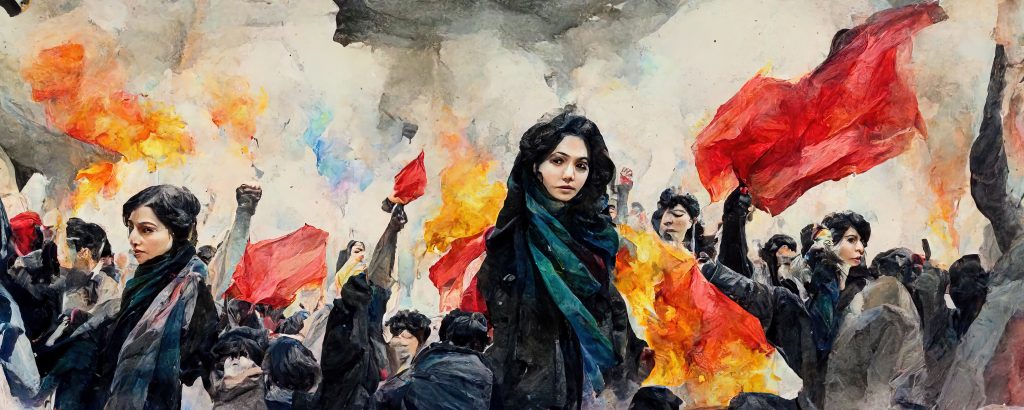FRESH AIR
“We have no reason to be enemies”: Israeli women in solidarity with the Iranian protest movement
October 27, 2022 | Tammy Reznik

Whilst it may not be surprising in today’s post #METOO era to see women around the world rallying together against the oppressive state of Iran, the support coming out of Israel, a country that is not recognised as a legitimate one by Iran, is by no means insignificant.
Women in the state of Israel, celebrities, singers and members of the Knesset (MKs) alike, are using their voices to offer their solidarity with Iranian women protesting against the theocratic regime in Teheran. That regime has, since the 1979 Islamic Revolution, defined for its citizens every rule of modesty, dress and basic freedom – while also denying Israel’s very right to exist. Yet many Iranian protestors appear more than willing, even eager, to receive support from their Israeli sisters.
For Iranians, working with Israelis may be an act of defiance against the regime even more potent and dangerous than the removal or burning of headscarves, which has been the main symbolism of the huge nationwide uprising sparked by the death of 22-year-old Mahsa Amini in the custody of the morality police on September 16.
The Islamic Republic of Iran considers the Jewish state’s very existence blasphemous, and visiting Israel or engaging in artistic cooperation with Israelis is a serious criminal offence.
Yet amazingly, in a life-imitating-art moment, music recorded by anonymous Iranian musicians along with Israeli singer and actress Liraz Charhi (who played a Mossad spy in the Israeli TV series “Tehran”) has become a soundtrack for the current wave of protests. Charhi’s Farsi lyrics “Until when will we be silent, until when will we keep our head down” can be heard in protest videos and at the rallies taking place across Iran.
Of Iranian descent herself, the 44-year-old Charhi has been finding other ingenious ways to reach into Iran’s cultural sphere from the outside and circumvent the regime’s restrictions. Recently, she facilitated a joint recording session with anonymous Iranian singers in Turkey, using that location because both Israelis and Iranians can travel there and Iranians do not require visas to enter.
According to reports, Charhi’s debut 2018 album “NAZ”, which also features Iranian artists, became a favourite in the underground rave party scene in Iran, where women reportedly removed their hijabs and danced in secret. Charhi’s resolve and creativity are admirable, but she is not the only Israeli artist crossing the boundaries of religion and culture in a show of support and solidarity with the oppressed women in Iran.
An even better-known Israeli performer, usually known simply by her given name Rita, has also made very public overtures in support of women in Iran. The singer’s surname is Yahan-Farouz, and her family left Iran when she was eight. Rita has always maintained a connection to her place of birth. “We immigrated nine years before the revolution, so we lived in a country that really wanted to westernise,” she recalled.
Of the current situation, Rita announced, “Dear Iranians, I, Rita Yahan-Farouz, am standing with you the Iranians today, and especially with my dear sisters the brave women of Iran…Women are standing these days heroically for freedom in front of bullets. All women in the world are Mahsa Amini today.”
The popular support for the plight of Iran’s oppressed population has also crossed into the sphere of lawmakers, as MK Sharren Haskel, a member of the centre-right National Unity party, told the International Christian Embassy conference, “As a (former) fighter in the IDF, I salute the brave women and their children who are fighting for their future and their homes.”
Then, on October 6, in the week after Jewish New Year, hundreds gathered in Jerusalem’s Independence Park to rally in solidarity with the Iranian women, many themselves of Iranian descent. “I know that there’s a deep connection between Israel and Iran,” said one of the protestors, Shelley Salemnia. “My family used to move between Israel and Iran back in the day before the revolution.”
That protest was co-organised by Shoshana Keats Jaskoll and Jerusalem Deputy Mayor Fleur Hassan-Nahoum, who told the crowd, “We want to say here in Israel that we believe you deserve your freedom.” The crowds replied with chants and placards in Hebrew, English and Farsi “Women. Life. Freedom”, the key slogan of the Iranian protest movement.
Another large rally is planned for Tel Aviv this weekend.
In a predictable turn, Iran’s ageing Supreme Leader Khameini pulled out his favourite conspiracy theory, saying that “explicitly and clearly [the] riots and insecurity was planned by America and the usurper, fake Zionist regime.”
Obviously, this is not true, but it is absolutely true that many Israelis, and especially the tens of thousands of Israeli Jews whose families came from Iran, are eager to stand in solidarity with the inspiring, purely indigenous Iranian protest movement.
And despite the Iranian regime’s venomous policies and vicious propaganda against the Jewish state, including frequent promotion of open antisemitism, many protestors appear happy to welcome this support.
This suggests a better future may be coming for the relationship between Israelis and Iranians. In the words of Rita, “The time will come when we can be in friendship. We have no reason to be enemies.”
Tags: Iran, Israel, Khamenei, Liraz Charhi, Mahsa Amini
RELATED ARTICLES

US Middle East strategy amid regional instability: Dana Stroul at the Sydney Institute






















